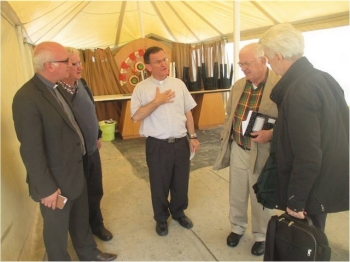60 years of service to the Hebrew speaking Catholic community

Sixty years have passed since temporary permission was granted to the Work of Saint James by the then Latin Patriarch of Jerusalem, Alberto Gori, and since the first mass was celebrated in Latin in Jaffa.
The Association has been called to work for the development of the Catholic community, to help Jewish converts to Catholicism to integrate both into the Universal Church and into the Israeli community, to raise awareness within the Church of her Jewish origins, and to combat anti-Semitism. In 2013 the Vicariate of Saint James was established: it pursues the Work’s mission and promotes pastoral care as well as evangelization and training for migrant workers, refugees, and asylum seekers.
Speaking about the vocation of the kehillot (Hebrew speaking parish communities), Father Neuhaus, head of the St. James Vicariate for Hebrew speaking Catholics in Israel, said: “part of the vocation of these kehillot is to live in a Hebrew speaking Judeo-Israeli society. Some of us are Jews, others are not. We form a discreet and loving presence that carefully respects the society around us. We are very sensitive towards the Jewish people, towards their history and culture.”
Father David Neuhaus recalls how there is good reason to be thankful for all that has happened since the first day of these communities: the conciliar document Nostra Aetate, which marks the 50th anniversary of diplomatic relations between the Holy See and the State of Israel, and the growth of the kehillot, which today are seven in number and belong to this Vicariate. But there are also many challenges that these communities are facing. Perhaps the most significant is finding ways to transmit the Faith to the new generations that are increasingly tempted to assimilate into Jewish and secular society, and sometimes, to convert.
Creating a bridge between two worlds
To celebrate the 60 years since the first kehillot’s founding in Israel, a documentary was produced, in which one can listen to the various testimonies of community members of all ages. It is beautiful to see that the words most often repeated are “home” and “family”.
For the youngest ones there is a group called “The flowers of the desert” – a name that is in itself very significant – and the teenagers joyfully spoke about the great experience of summer camps, during which they learn a lot about their faith but also simply spend time together to play and have fun.
A young seminarian who is serving in one of kehillot explains how the relationships that young people form at these camps are important: “These children live in a non-Christian society. Many of them attend public schools and only have Jewish friends. This could give the impression of being isolated and marginalized by society. At the summer camps, they meet other young Christians and build relationships that will last.”
In addition to the teenagers, the Vicariate pays special attention to the youngest children. Sister Claudia Graziano tells of the particular situation of the children of migrant workers. “We try to work for the new Christian population of the country. There are children – and the children you see in the video are under two years old – from Sri Lanka, the Philippines, Ethiopia, Eritrea and South America, and they are all Christians. The majority belong to families with single parents.” The presence of a single mother for a child, or even of both parents but not of grandparents, is reflected in the great difficulty of having the time to take care of your son. These people, Sister Cristina says, “often work as cleaners without formal contracts, and this means they have no holidays to spend with their children.”
Another particular challenge is creating bridges between the Palestinian world and the Israeli world. Father Neuhaus writes in his pastoral letter: “We are all invited to reflect on the fact that God Almighty has planted the seed of faith in Christ deep in the soil of both Palestinian (and Arab) and Israeli societies. Does this have significance for the vocation of Christ’s disciples who, though separated by walls of enmity because of the ongoing conflict, are united by their faith in Christ? [...] Brought together, despite the walls of enmity, because “He is our peace”, Hebrew speaking and Arabic speaking disciples of Christ are called to show that justice, peace and equality are possible in our land.” Cardinal Pietro Parolin, Secretary of State of the Holy See, informed the Vicariate of Pope Francis’ apostolic blessing on this celebratory anniversary.
(January 8, 2016)



